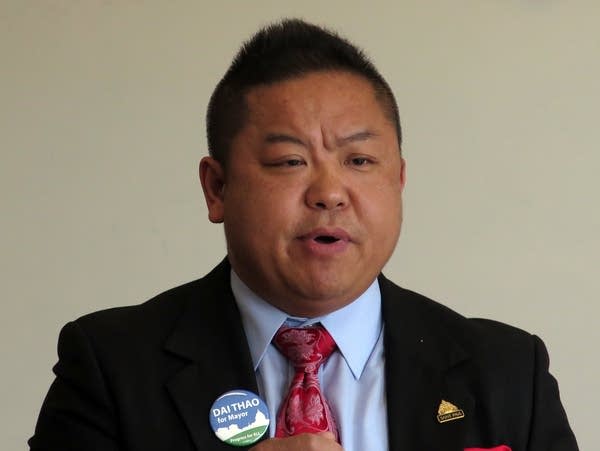Campaign investigation rocks St. Paul mayoral race
Go Deeper.
Create an account or log in to save stories.
Like this?
Thanks for liking this story! We have added it to a list of your favorite stories.

Allegations that St. Paul City Council Member Dai Thao and his campaign sought improper donations have his mayoral bid under scrutiny by state investigators. But Thao's campaign may not be the only one feeling the pressure. The incident could upend the contest among his political rivals.
The corruption investigation comes at a crucial time in city elections that could swing this year's mayoral race — and even impact future state politics.
There are six candidates vying to succeed mayor Chris Coleman, who is running for governor.
How they respond to the allegations against Thao will set the tone for the race to come, said David Schultz, a political science professor at Hamline University.
Turn Up Your Support
MPR News helps you turn down the noise and build shared understanding. Turn up your support for this public resource and keep trusted journalism accessible to all.
"It's not just in terms of if, in fact, there is any criminal problem involving him," said Schultz, "but even sort of the stories that are already circulating. They work to the advantage of others who are running for mayor in St. Paul, such as, for example, Melvin Carter."
In the last 10 days, Carter, Thao and Pat Harris have won significant support from the city's dominant DFL party.
And while that's a three-way battle, politics in St. Paul are often binary: moderate DFLers against progressive DFLers.
This year, Harris, a moderate, is vying with progressives Carter and Thao. Progressive candidates have a nearly 3 to 1 edge in pledged supporters after recent DFL precinct caucuses.
But as they prepare for a decisive DFL endorsement battle in June, neither Thao nor Carter has enough support yet to become the DFL candidate. Winning that endorsement could give one of them a boost in November.
The fall election is where moderate mayoral candidates have traditionally done best, said Larry Jacobs, a political science expert at the Humphrey School of Public Affairs.
"With two progressives fighting over a similar set of supporters, that played into Harris' hope to block an endorsement," said Jacobs. "And that would play into his hand of going into the ranked choice election without an endorsed candidate."
If bribery allegations damage Thao politically, progressive voters could close ranks behind Carter and pose a stronger challenge to Harris.
Carter's campaign spokesperson Emily Weber says that was not the campaign's strategy and they weren't responsible for the allegations against Thao coming to light.

"We are focused on engaging St. Paul voters on Melvin's vision for our city's future," said Weber.
Harris called the controversy a peripheral issue and a distraction from his message.
However, the political machinations in St. Paul could have broad implications for the state because local policy initiatives have proven to be a successful strategy for making change.
The statewide smoking ban started in St. Paul. And in Minneapolis, tens of thousands of people could earn paid sick leave thanks to a landmark city ordinance — a policy that already has state lawmakers threatening to intervene.
Peter Nelson, with the right-leaning Center of the American Experiment, said a minimum wage ordinance could be a game changer for the state, even if it's just in Minneapolis for now.
"When the city of Minneapolis imposes a $15 minimum wage, these other cities are going to find it hard to compete with certain types of workers," said Nelson.
Still, Minneapolis and St. Paul have remained distinctly different, said Hamline's Schultz.
"In many ways, St. Paul has probably been a little more conservative of the two cities, although still liberal by large comparisons," said Schultz. "But certainly not moving in the same direction as aggressively as Minneapolis."
But this year's election could steer the cities closer together, said Jacobs.
"As we've seen in the past, with same-sex marriage, with kind of work rules, we could be seeing in this race in St. Paul, the consolidation of a pretty progressive orientation right at the center of Minnesota politics."
Thao has denied the allegations against him. He did not respond when contacted for this story.
Correction (May 3, 2017): An earlier version of this story included a photo caption using an incorrect surname for Eric Foster.



